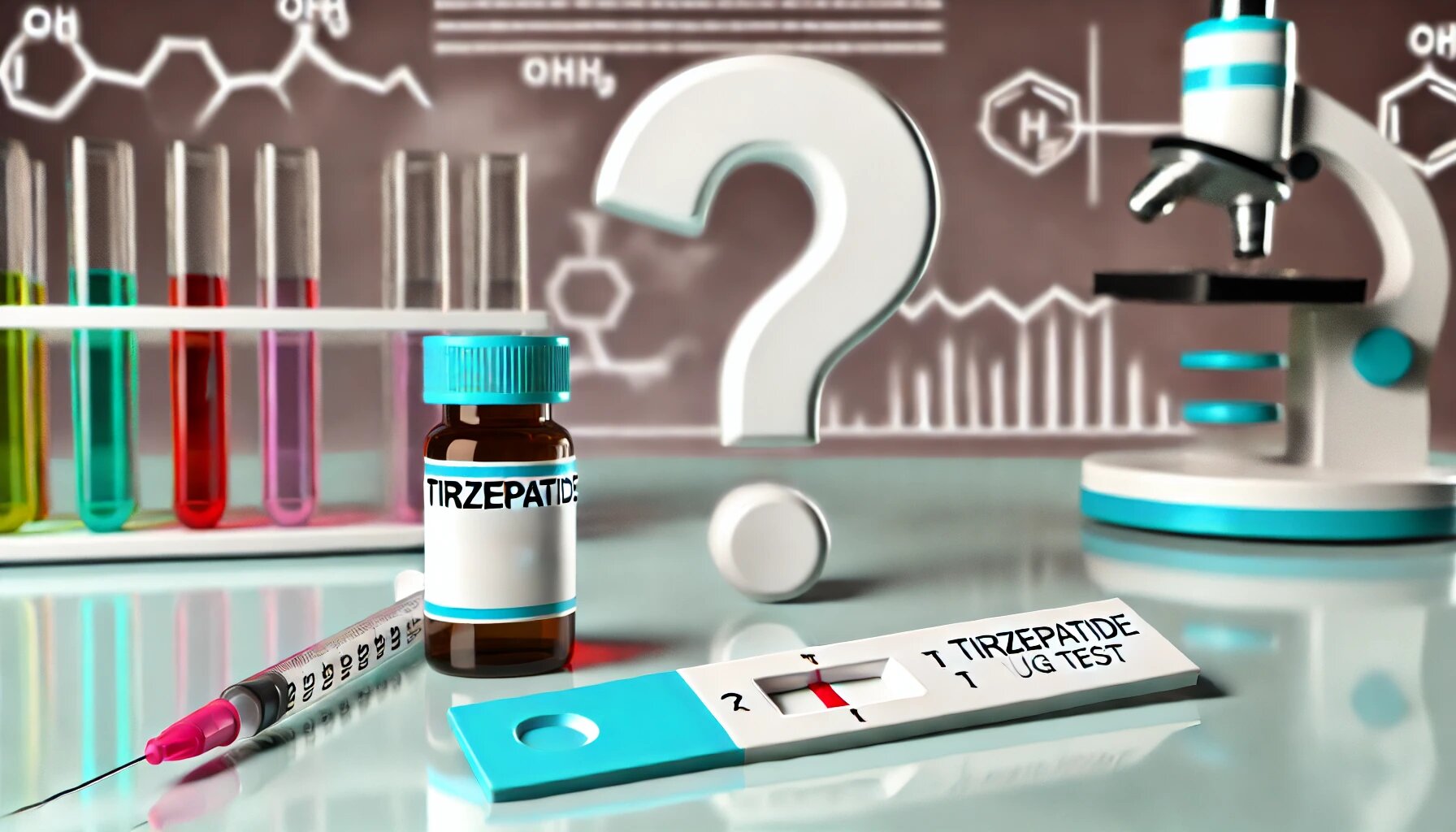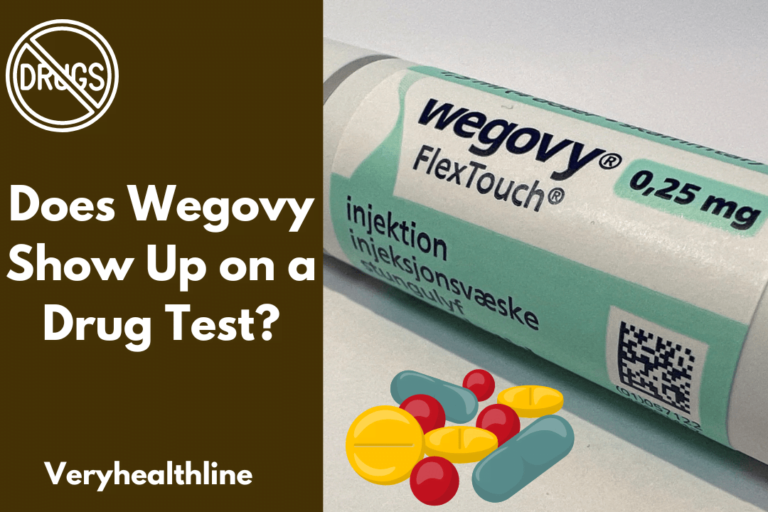Does Tirzepatide Show Up on a Drug Test? Everything You Need to Know

When considering whether Mounjaro or tirzepatide shows up on a drug test, it’s essential to understand that standard drug tests are designed to detect specific substances in the body, typically focusing on illegal drugs and certain prescription medications that could affect safety and compliance in environments like workplaces or sports.
Mounjaro falls into the category of medications used to treat medical conditions like type 2 diabetes, and it doesn’t typically appear on these tests.
However, in specialized testing panels, especially in clinical trials or specific workplace drug testing programs that target diabetes medications, tirzepatide might be included as part of a more comprehensive analysis.
There’s also a rare possibility that Mounjaro could trigger a false positive for amphetamines due to some structural similarities, but this can usually be resolved with further testing or by providing proof of a valid prescription.
1-Understanding Mounjaro (Tirzepatide)
Mounjaro, known generically as tirzepatide, is a medication specifically designed for the treatment of type 2 diabetes. It belongs to a new class of drugs that act as dual glucose-dependent insulinotropic polypeptide (GIP) and glucagon-like peptide-1 (GLP-1) receptor agonists, effectively mimicking the body’s natural hormones to help regulate blood sugar levels.
Unlike other diabetes medications, Mounjaro is administered via injection weekly, offering a unique approach to managing the condition. This advanced treatment option has shown promise in helping patients maintain better control over their blood sugar levels with the convenience of less frequent dosing.
How Mounjaro Works in the Body
When Mounjaro is administered, it targets both GIP and GLP-1 receptors in the body, providing a dual action that enhances insulin secretion and suppresses glucagon production.
This combination leads to improved blood sugar control and can also slow food movement through the stomach, which may contribute to weight loss. Preliminary studies have shown that Mounjaro might offer additional cardiovascular benefits, such as a reduced risk of heart attacks and strokes in patients with type 2 diabetes.
Also Read: Does Wegovy Show Up on a Drug Test?
2-What Do Drug Tests Look For?
Drug tests are designed to identify the presence of specific substances and their metabolites in bodily fluids such as urine, blood, or saliva. These tests commonly screen for illegal drugs, prescription medications, and sometimes over-the-counter medications to ensure safety and compliance in various settings.
The focus is detecting anything impacting a person’s ability to perform tasks safely rather than targeting medications used for legitimate medical treatments like tirzepatide.
Commonly tested substances include:
Drug tests often screen for a range of substances, including Marijuana, Cocaine, and Opioids like heroin and codeine. Amphetamines and their more potent form, methamphetamine, are also commonly checked.
Additionally, Benzodiazepines such as Xanax and Valium, along with Barbiturates, are substances that are frequently detected in these tests, mainly because of their potential impact on safety and performance in various environments.
3-Does Mounjaro Appear on a Drug Test?

The answer is generally no; Mounjaro (also known as tirzepatide) does not appear on a standard drug test. Drug tests are typically designed to detect drugs that might impact safety or performance rather than medications used to treat medical conditions like diabetes.
However, in some specialized testing panels, such as those used in clinical trials or specific workplace drug testing programs, tirzepatide might be included in a comprehensive analysis.
There is a rare possibility of false positives for amphetamines due to structural similarity to these substances, but this can usually be resolved with further testing or by providing proof of a valid prescription.
4-Drug Tests: What Are They Looking For?
Before discussing whether Tirzepatide shows up on a drug test, it’s essential to understand what drug tests are designed to detect. Most standard drug tests, whether for employment or sports, are looking for substances such as:
- Illegal drugs like marijuana, cocaine, amphetamines, and opiates.
- Prescription medications that have the potential for abuse, such as benzodiazepines, opioids, and certain stimulants.
- Performance-enhancing drugs like anabolic steroids.
These tests typically involve urine, blood, hair, or saliva samples and are designed to detect specific substances that indicate the use of these drugs.
5-Will Tirzepatide Show Up on a Drug Test?
The simple answer is: No, Tirzepatide will not show up on a standard drug test. Here’s why:
- Tirzepatide is Not a Controlled Substance: Drug tests are typically looking for controlled substances, including illegal drugs or prescription medications that are often abused. Tirzepatide does not fall into this category. It is a prescription medication specifically for managing type 2 diabetes and has no potential for abuse or addiction.
- No Relevance to Employment Drug Tests: Employers commonly test for substances that could impair job performance or indicate drug abuse. Tirzepatide, a diabetes medication and does not affect cognitive or motor functions.
- Not a Performance-Enhancing Drug: In sports, athletes are tested for substances that could give them an unfair advantage, such as steroids or stimulants. Tirzepatide does not enhance physical performance or muscle growth so that it wouldn’t be flagged in sports-related drug testing.
6-Special Considerations for Medical Drug Tests
Sometimes, a drug test may be performed for medical purposes rather than for employment or sports. For example, doctors may order tests to monitor the levels of certain medications in the bloodstream. However, even in these cases, Tirzepatide is not a drug that requires monitoring through standard drug tests.
7-Potential Concerns and Misconceptions
Some patients may still have concerns despite the reassurance that Tirzepatide won’t show up on a standard drug test. Here are a few common misconceptions:
- Confusion with Other Medications: Some people worry that Tirzepatide could be confused with other medications that might show up on a drug test. However, drug tests are particular and designed to identify specific substances. Tirzepatide is chemically distinct from other drugs, so there’s no risk of confusion.
- Interaction with Other Medications: If you’re taking multiple medications, you might worry about how they interact and whether that could affect drug testing.
- False Positives: A false positive occurs when a drug test incorrectly identifies a substance that isn’t present. This is usually due to cross-reactivity with substances that are chemically similar to the drugs being tested for.

8-What Should You Do If You’re Still Concerned?
If you have any concerns about how Tirzepatide might affect drug testing, it’s always a good idea to speak with your healthcare provider. They can offer reassurance and provide documentation explaining that you are taking Tirzepatide as prescribed for managing diabetes.
9-Conclusion
Tirzepatide is a groundbreaking medication for type 2 diabetes management, offering benefits like improved blood sugar control and weight loss. However, it’s understandable to have concerns about whether it could affect drug testing, especially if you’re subject to such tests for employment or sports.
The good news is that Tirzepatide will not show up on a standard drug test, as it is not a controlled substance, performance-enhancing drug, or commonly abused medication. Your healthcare provider can provide additional guidance and support if you still have concerns.
FAQ:
Will tirzepatide show up on a urine test?
Tirzepatide is not typically detected in either feces or urine when undergoing a standard drug test. This means that if you’re concerned about whether tirzepatide could show up during routine testing, you can be assured that it usually won’t be found in these samples. This is because the drug is processed differently by the body and is not excreted in a way that standard drug tests would pick up. From my experience, knowing what to expect in these situations can help ease any worries, especially when you’re using medications like tirzepatide for legitimate health reasons.
Can Mounjaro interact with other medications?
Mounjaro can potentially interact with other medications, which might affect your drug test results. This is why it’s so important to discuss any medications you’re taking with your healthcare provider. By understanding potential interactions, you can avoid unexpected outcomes in your drug tests. In my experience, having open conversations with your doctor ensures that you’re fully aware of how Mounjaro might work alongside other treatments, helping you manage your health more effectively.
Is tirzepatide a controlled substance?
Mounjaro, which is available as a 5 mg/0.5 mL pre-filled single-dose pen, is not classified as a controlled substance under the Controlled Substances Act (CSA). This means that Mounjaro is regulated differently than medications that are considered to have a higher potential for abuse or dependency. From my perspective, this classification provides patients with greater access to this important medication without the strict regulations associated with controlled substances.
Can Ozempic cause a positive drug test?
Ozempic, which contains the active ingredient semaglutide, works by triggers insulin production to help regulate blood sugar levels. It’s important to note that Ozempic is not a controlled substance, and it typically does not appear on a drug screening test. This means that using Ozempic is unlikely to result in a positive test, as drug tests are generally not designed to detect medications like semaglutide.
Useful Resources
Mounjaro Official Website- Mounjaro (Tirzepatide)
Cleveland Clinic- Drug Test





